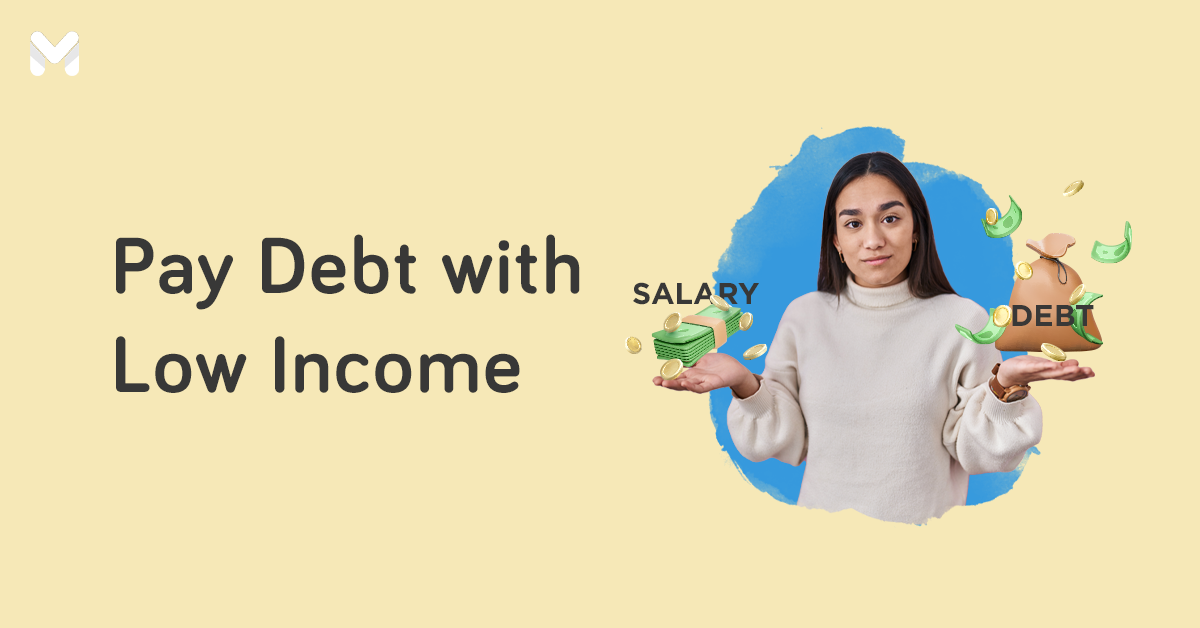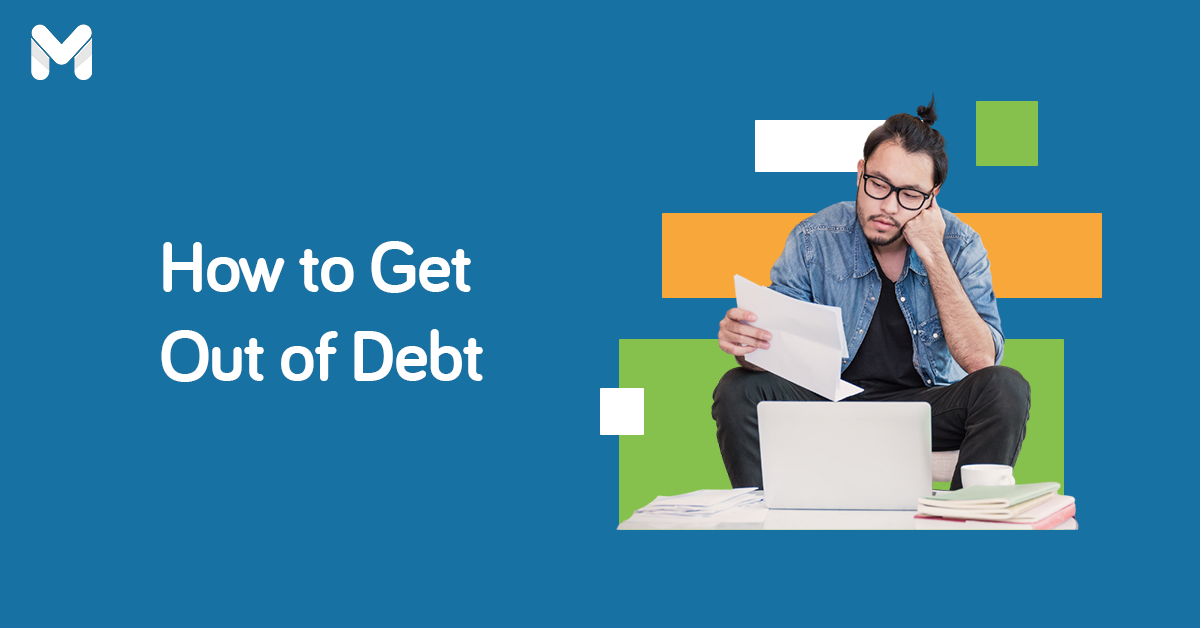A credit card is a two-edged sword. Use it properly, and you’ll surely enjoy advantages like convenience and exclusive incentives. Overuse it, and debts will come back to bite you.
Paying off credit card debt should come as second nature to cardholders—very much like how you settle your monthly electric bills or home mortgage. But for whatever reason, you might struggle with paying off your balance.
Don't worry—it happens to the best of us. The willingness to learn how to pay off credit card debts is the first step.
Remember, though, that what worked for others may not work for you. You must analyze your situation thoroughly.
Why You Should Pay Off Your Credit Card Debt Quickly
-Jun-13-2024-07-19-20-3416-AM.png?width=600&height=400&name=Pics%20for%20blog%20-%20600x400%20(19)-Jun-13-2024-07-19-20-3416-AM.png)
Financial freedom is the ultimate benefit. Let's go into the specifics:
✅ Deal with Less Interest
When your debt drags on, you prolong your agony. You’re not only paying the amount you borrowed—you’re also paying interest.
The longer you pay off your debt, the longer you deal with the interest. And if you falter along the way, you’ll also cover penalties.
In contrast, if you pay your credit card debt as quickly as possible, you could end up saving thousands of pesos in the long run.
✅ Improve Your Credit Score
When you pay your balances regularly and promptly, you’re likely to have a good credit score.
Remember, a good credit score will unlock a lot of opportunities. For one, it may help you qualify for mortgage and car loans easily. On top of that, your lender may offer a low interest rate since they know you’re a responsible payer.
✅ Reduce Bills to Pay
You have many bills to pay, and your credit card debt is just one of them. The more creditors or lenders you owe, the more stressful your situation.
Deal with your credit card debt right away, starting with the small ones. That way, you’ll receive fewer statements in the following months. Ultimately, you'll have one less thing to worry about.
✅ Beef Up Savings Faster
When you pay off your credit card debt, a part of your monthly income goes toward it. But if you deal with it quickly, the money that could have gone towards repayment can now go into your savings account.
✅ Enjoy Spending Without Feeling Guilty
When you don’t pay your debt right away, you have less money to use for the things you want. You'll feel guilty when you buy that fancy leather handbag or treat your family to a delicious lunch.
If you can’t afford some things because of debt, you might even borrow money. You may end up trapped in a vicious cycle.
How to Pay Off Credit Card Debts in 6 Ways
-Jun-13-2024-07-24-17-5957-AM.png?width=600&height=400&name=Pics%20for%20blog%20-%20600x400%20(20)-Jun-13-2024-07-24-17-5957-AM.png)
So how to settle credit card debt? It’ll largely depend on the size of your debt and the amount of money you make. The goal is to keep your debts from growing into an insurmountable mountain.
The techniques below illustrate how to get out of credit card debt:
📌 Debt Snowball Method
To efficiently deal with debt, you may need to change how you view it. For one, think of debts as tasks you need to cross out of your list.
The debt snowball method works like this:
- First, put more money into the smallest debt on your list.
- Simultaneously make small payments on other debts.
- Every time you finish paying off a balance, move on to the next smallest debt. Put more money toward it while making small payments on your other debts.
👍 Pros: This is an ideal method if your debts are small and manageable, as you’ll be able to pay them off quickly. Crossing out each debt one by one will also inspire you to finish all your credit card-related obligations.
👎 Cons: The snowball method works best for small debts. If you use this for large debts, you’ll find yourself paying the bank or credit card company for longer. Extended terms mean more interest over time.
📌 Debt Avalanche Method
The debt avalanche method is similar to the debt snowball scheme, except you'll deal with the largest debts first:
- Start paying high-interest debts first while making small payments on other debts.
- After paying off a debt, move on to the next biggest balance while also making minimum payments on your other debts.
- The process goes on until all the debts on your list are eliminated.
👍 Pros: The debt avalanche method helps you save more money in the long run. If you finish paying off large debts first, you won’t have to worry about paying more interest over an extended period. This means bigger savings on your end.
👎 Cons: This may not be the most suitable payment scheme for people without large disposable income. They may find themselves borrowing more money just to deal with high-interest debt.
📌 Debt Consolidation Loan
If you have multiple debts, such as a home mortgage, car loan, and credit card balance, it can be confusing to keep track. You might even miss some due dates since you’re making separate payments for each. To simplify your finances, look into debt consolidation.
With debt consolidation, all your debts will be combined into one new loan. This means you can make a single payment every month.
Looking for a debt consolidation loan? Consider the UnionBank Personal Loan:
👍 Pros: Because you’re making only one payment for all your debts every month, you won’t miss your due dates. You’ll be able to pay off your credit card balance more quickly.
You’ll pay the same amount every month, so you already have an idea of how much you should set aside. Furthermore, you’ll cover only the consolidated loan’s interest rate, which is usually much lower than typical rates.
👎 Cons: Banks typically offer this service only to those with good credit scores. Also, keep in mind that your new interest rate will depend on your credit standing, so there’s a chance you could still end up paying a higher rate. You'll also cover some upfront costs, such as balance transfer fees and costs of loan origination and closing.
📌 Balance Conversion
What is balance conversion for credit cards? Balance conversion is a repayment scheme where cardholders can convert their outstanding credit card balance into manageable installments.
For example, if the total amount of all your purchases for this month is ₱15,000, this amount will be converted into the agreed number of installments. So if you agree to pay that ₱15,000 in six months, you’ll pay ₱2,500 per month plus interest. Banks such as UnionBank,[1] Metrobank,[2] HSBC,[3] BPI[4], and RCBC[5] offer credit card balance conversion to installment.
👍 Pros: This method is a good choice if you plan to buy big-ticket items (appliances, furniture, etc.) in one go. Banks also offer flexible payment terms, with installments of up to 24 months.
👎 Cons: If you have an unfavorable payment record, you may not be able to avail of this plan. Banks usually offer balance conversion only to cardholders with good credit standing. Furthermore, some banks require a minimum outstanding balance that can be converted into installment payments.
📌 Balance Transfer
-Jun-13-2024-07-28-25-2679-AM.png?width=600&height=400&name=Pics%20for%20blog%20-%20600x400%20(21)-Jun-13-2024-07-28-25-2679-AM.png)
With this method, you'll move your credit card debt to a new card with a lower interest rate or more lenient payment terms.
Compare some balance transfer credit cards:
| Credit Card | Balance Transfer Features |
|
UnionBank Platinum Mastercard
|
|
|
Metrobank Titanium Mastercard®
|
|
|
HSBC Red Mastercard
|
|
|
Security Bank Gold Mastercard
|
|
|
BPI Edge Card
|
|
👍 Pros: If you transfer your outstanding balance to a credit card with a lower interest rate, you’ll pay less over time. With less interest, a larger portion of your payment will go toward reducing your balance. You can also take advantage of your new card’s better payment terms, such as a longer grace period, lower penalties, and more exciting rewards.
👎 Cons: Usually, only those with good credit standing can transfer their balance and enjoy low interest rates. If you have a bad credit standing, you might be offered the regular interest rate only.
Also, check if your new card has higher annual fees and miscellaneous costs.
Read more: Is a Balance Transfer Credit Card a Good Idea? Here's How It Works
📌 Credit Card Amnesty Program
The Bangko Sentral ng Pilipinas and Credit Card Association of the Philippines' credit card amnesty program is called the Interbank Debt Relief Program (IDRP). Members of this credit card amnesty program include top banks such as UnionBank, Metrobank, HSBC, Security Bank, and BPI.
Through the IDRP, you can consolidate or restructure your credit card debts. This program offers affordable monthly amortization and lower interest rates.
👍 Pros: You can enjoy a low interest rate—a maximum of 1.5%! If you have sizeable debts, you may be given a longer repayment term of up to 10 years. You can get back on track more easily.
👎 Cons: Your bank has to be a member of the IDRP. The requirements can be pretty strict, too.
For example, some banks may reject your application if they find out that you’ve used your credit cards for purchases related to luxury, gambling, and extensive travel. If you’re more than 65 years old, the bank may also reject your application.
Read more: Take Back Control: Credit Card Amnesty Program in the Philippines
How to Avoid Credit Card Debt
-Jun-13-2024-07-30-01-7303-AM.png?width=600&height=400&name=Pics%20for%20blog%20-%20600x400%20(22)-Jun-13-2024-07-30-01-7303-AM.png)
Now you know how to pay off credit card debts. But truth be told, subsequent recovery may prove to be quite challenging. To put it bluntly, prevention is better than cure.
Here are four tips to avoid falling into the debt trap:
👉 Don’t Miss Your Credit Card Payments
Remember that your credit card balance incurs interest and late fees if you don't pay on time. Your credit rating will also take a hit, making it difficult to get loans.
Say you’ve got a 3% interest rate on your credit card, and a recent purchase worth ₱10,000. If the minimum payment a month is around ₱500, that leaves a ₱9,500 balance with an additional 3% added every month it goes unpaid.
If you pay only the minimum, you’ll end up paying a lot more interest. You’ll find it hard to get out of debt.
Here are some tips so you end up with little or no credit card debt:
- Pay your bill in full and on time.
- If you can’t pay in full, pay as much as you can before the due date.
- Always be mindful of the due date.
- Keep your statements archived so you can track your purchases and make sure there are no fraudulent transactions.
Read more: Is It Best to Pay Your Credit Card in Full? What Happens If You Don't?
👉 Set a Personal Maximum Balance
Providers assign a credit limit. If you aren’t careful, you can easily max it out. Set a personal monthly charge limit at an amount you feel you can easily pay off on time.
Here’s another reason to stay well below your limit: standard credit scores use credit utilization[6] as a major metric. This refers to the ratio of outstanding credit to the maximum credit available on your card. The lower this is, the better.
Read more: Credit Card Dos and Don’ts: What Should You Do and Not Do with Your Card?
👉 Use a Cash Advance Only When Necessary
Making frequent cash advances using your credit card is a quick way to accumulate debt. Each cash advance comes with fees and a different interest rate than your regular one.
So as much as possible, avoid borrowing money using your credit card.
👉 Remember That Your Card is Not Cash
Your credit card is not an extension of your paycheck or emergency fund. Given the rising cost of living, the only real way to ensure you aren’t driven into debt is to either lower expenses or build a better budget.
Plus, if you don’t have one already, build an emergency fund now. This way, you won’t go into debt if the worst happens.
Final Thoughts
You often hear horror stories about how credit cards land people in inescapable financial misery. These tales might have given you a negative impression of cards or made you unreasonably anxious about using one.
Let’s put it this way: credit cards don’t cause debt. They are just tools. It’s always up to you how to use them.
Unfortunately, a lot of people are either attracted to these cards' purchasing power or just clueless about proper card use. The key to learning how to pay off credit card debts is to practice mindful spending, whether you’re a credit card newbie or an experienced cardholder with multiple credit lines at your disposal.
Sources:
- [1] UnionBank EasyBill
- [2] Metrobank Balance Conversion
- [3] HSBC Card Balance Conversion
- [4] BPI Balance Conversion
- [5] RCBC Balance Conversion
- [6] Understanding Credit Utilization (The Balance, 2022)







_1200x350.png?width=751&height=219&name=UB_PL_Generic_2_(Jan_2025)_1200x350.png)
_1200x350.png?width=734&height=214&name=UB_PL_Generic_2_(Jan_2025)_1200x350.png)






.png)

